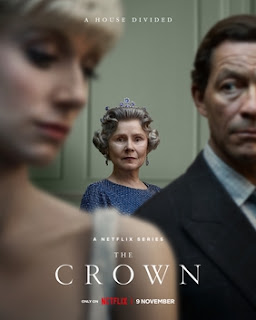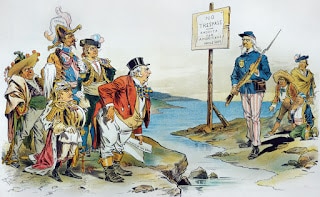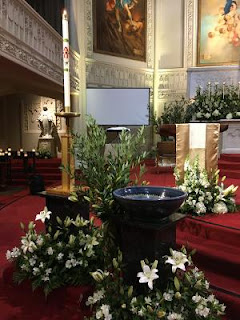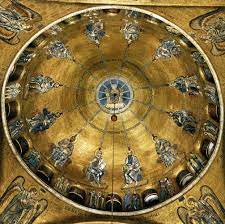The popular Netflix series The Crown has now released its long awaited fifth season – starring Imelda Staunton as Queen Elizabeth II, Jonathan Price as Prince Philip, Dominic West as the then Prince of Wales, and Elizabeth Debicki as Diana. Given this season’s chronologically inevitable focus on the marital breakup of the Prince and Princess of Wales and other private and public misfortunes which befell the British royal family during that particularly painful period, season 5 was always going to generate controversy.
The Crown is, of course, as Netflix itself has been pressured to acknowledge, a dramatic fiction. It is, however, an extravagant Hollywood version of dramatic fiction about historical characters and events that are within living memory, aimed at a worldwide audience whose accurate knowledge and understanding of even very recent British history is increasingly limited. It deals with a series of tragic episodes, in which admittedly probably few of the participants proved to be at their best. Unfortunately, it may appear to peddle some of the worst misrepresentations about those episodes. And, of course, as already said, many of the persons being misrepresented are very much alive and active in public life. One of them, after all, has just become king and will shortly be solemnly crowned, together with his second wife. So the damage done by misrepresenting people and events in the recent past is potentially much more significant than the consequences of fictionalizing events that happened in the 1950s and even earlier (e.g., The Crown‘s somewhat strangely sympathetic initial portrayal of the Duke of Windsor) or even in the 1960s (e.g., The Crown‘s bizarre depiction of a personal rivalry between Queen Elizabeth and Jacqueline Kennedy).
Thus, no less a person than Oscar-winning Dame Judi Dench, who once played a queen herself in Shakespeare in Love (1998), has spoken out in an open letter to The Times of London, criticizing the series for its « inaccurate and harmful account of history. » She wrote that « the closer the drama comes to our present times, the more freely it seems willing to blur the lines between historical accuracy and crude sensationalism. » She recognizes The Crown « for the brilliant but fictionalized account of events that it is, » but fears « that a significant number of viewers, particularly overseas, may take its version of history as being wholly true. » She calls this « both cruelly unjust to the individuals and damaging to the institution they represent. » Dench has called on Netflix to include a disclaimer at the start of each episode, which thus far Netflix has failed to do. She is right on both counts. The Crown cannot be considered or treated as the last word when it comes to actual history, but it is mostly very good historical drama to be enjoyed by discerning interpreters of that history.
Also speaking out has been former Tory Prime Minister Sir John Major, who is portrayed in the series – and who in episode 9 shines as mediator in the Wales’s divorce negotiations. Major, who has not « co-operated in any way » with the program has described it as a « barrel-load of nonsense. » In particular, he has spoken out against a fictional scene in which the Prince of Wales is portrayed as lobbying the Prime Minister to help him replace his mother on the throne. « There was never any discussion between Sir John and the then Prince of Wales about any possible abdication of the late Queen Elizabeth II – nor was such an improbable and improper subject ever raised by the then prince of Wales (or Sir John), » according to Major’s spokesman. From the other side of the Despatch Box, former Labour Prime minister Tony Blair (who replaced Major in 1997) denounced a scene in which he is asked to help the (by then) divorced Prince of Wales to remarry “It should come as no surprise that this is complete and utter rubbish,” according to Blair’s spokesperson.
Inevitably, The Crown must engage in fictionalization. We can have no certain knowledge and can at best only surmise what happened in conversations among members of the Royal Family and between the Queen and her ministers. Everyone understands that – or should. And, like all dramas about the British royal family, inevitably the fiction embraces a certain point of view. Thus, a film like The Queen (2006) was full of imagined conversations and implications about the private attitudes and beliefs of the movie’s characters. Still, the story stayed close enough to what was known and remained within the limits of what was plausible, that it could work as an interesting (if not necessarily completely accurate) interpretation of the events it portrayed. For the most part in its first four seasons, The Crown has likewise only seldom strayed too far beyond the bounds of plausibility (e.g., the Kennedy episode).
The series does also suffer, perhaps, from a certain contemporary tendency to filter much of royal history through the very modern lens of the conflict between royal duty and personal satisfaction, with at least a finger on the scale in favor of personal self-fulfillment. The somewhat sympathetic portrayal of the Duke of Windsor in the earlier episodes of season 1 was an example of that, and there are again hints of a similar sympathy in the way Diana was portrayed in Season Four. But then, midway through season 2, the Duke of Windsor’s misbehavior during World War II was recalled. It seems even contemporary personal self-satisfaction may be required to draw the line when it comes to World War II and putative collaboration with the Nazis. In the end, therefore, the portrayal of Edward VIII tried to strike a certain balance. (Unfortunately, in season five, we are treated to yet more of the Duke’s vacuous post-abdication existence in flashbacks focused on – of all unattractive distractions – the story of the Al Fayed family, yet another problematic part of the perpetually problematic Diana agenda. Perhaps the weakest and most unfortunate feature of this season is the screen time annoyingly wasted on the Al Fayeds.)
The series also reflects a contemporary kind of moral ambivalence, according to which people want the monarch (and by extension the royal family) to be dutiful and virtuous, as it were vicariously so on behalf of the nation, which has largely abandoned such aspirations. (I think it was Stanley Baldwin, British PM in the 1930s, who said the ordinary worker would rather stay in bed on Sunday morning but expects the King and Queen dutifully to go to church on his behalf.) But, because those aspirations have been so largely abandoned, people simultaneously disparage those same virtues in favor of self-promoting glamor.
It may seem to be too much to expect balance in the portrayal of Diana, who is, of course, much more of a contemporary figure and who so successfully used the media to promote her own Diana agenda, a sympathetic image of herself and and negative image of everyone else. Indeed, one paradoxical result of the portrayals of Charles and Camilla in seasons 3 and 4 was to highlight how mistaken in the end it probably was to prevent them from marrying in the first place (and what an avoidable error the Charles-Diana marriage therefore was).
Season 5 starts with the 65-year old Queen nearing her 40th year on the throne. It is the politically unexciting era of John Major and the much more exciting media-induced time of tabloid royal scandals. In this vale of tears, even duty must have its limits. Some allowance accordingly needs to be made for human feelings – as we are reminded in the show’s treatment of Princes Anne’s second marriage and of Princess Margaret’s singularly sad romantic trajectory. One of the more sensitive episodes in the season, Episode 4 (framed by the Queen’s famous annus horribilis speech) feelingly, even tenderly, examines the human toll not just of the breakdown of the various royal children’s marriages but also of the breakdown of marriage as a social institution in today’s world and radically changing society.
Indeed, for all the (not undeserved) criticism of this season, at least in episode 5 it attempts to be fair to the then Prince of Wales. It recognizes and highlights his personal intelligence, seriousness, and hard work in, for example, the Prince’s Trust, his most famous and successful real-life initiative. Meanwhile, episode 6, highlighting the Queen’s 1994 state visit to post-communist Russia and the historic familial links with the Romanovs, represents a nice change of emphasis from the royal marriages’ melodrama – a reminder that important real-world events were also taking place and occupying the Queen’s attention at that time as well as a familial reckoning regarding the Romanovs’ tragic end.
But inevitably we come back to Charles and Diana. One of the best scenes of the two of them may be their intimate post-divorce conversation, which may or may not have ever actually occurred as depicted, but is an effective and plausible dramatic interpretation of how they may have processed their experience. (It is interestingly and effectively set against the background of other, more ordinary couples processing their marital breakdowns.)
This season started with a flashback of a much younger Queen (Claire Foy) launching the royal yacht Britannia. It ends on the eve of Britannia‘s decommissioning. (Reportedly the actual decommissioning was the one event when the Queen was seen to have cried in public.) The imminent threat to Britannia is one recurring (albeit low-key) leitmotif throughout season 5. It is well known, of course how much Britannia meant personally to the Queen and her husband – the only home they ever designed for themselves. But Britannia was for decades much more than just another royal getaway home. It was a floating, significant symbol of Britain’s greatness and of the Crown’s centrality to that greatness – something that penny-wise, pound-foolish politicians predictably failed to appreciate. Applying narrow-minded accounting principles to ascertain the value of moral and cultural symbols necessarily misses their true value. The fact that Britannia‘s final official voyage followed Britain’s abandonment of Hong Kong to to the tyrannical rule of China’s totalitarian Communist Party provides added pathos to the symbolism of Britannia‘s loss and Britain’s decline, which is, after all, the underlying political part of the story of The Crown.
Around 300 B.C., Greek poet Menander, is supposed to have said, “Time is the healer of all necessary evils.” Thankfully, the British royal family survived its 1990s decade horribilis – in large part because people’s appreciation of and their desire to identify Britain with the monarch’s vicarious virtue prevailed over the popular disparagement in the 1990s of those very same virtues. The alternative to the parody of royalty presented by the royal family’s perceived 1990s descent into contemporary decadence was powerfully provided by the outpouring of respect for Queen Elizabeth at her subsequent jubilees and, above all, after her death – and the instant, respectful recognition (absent any 1990s drama) of King Charles III and Queen Camilla.




